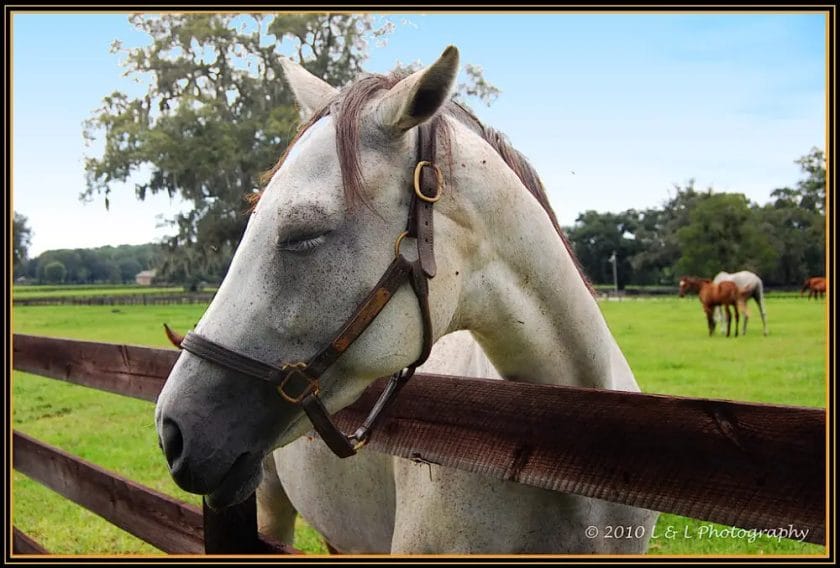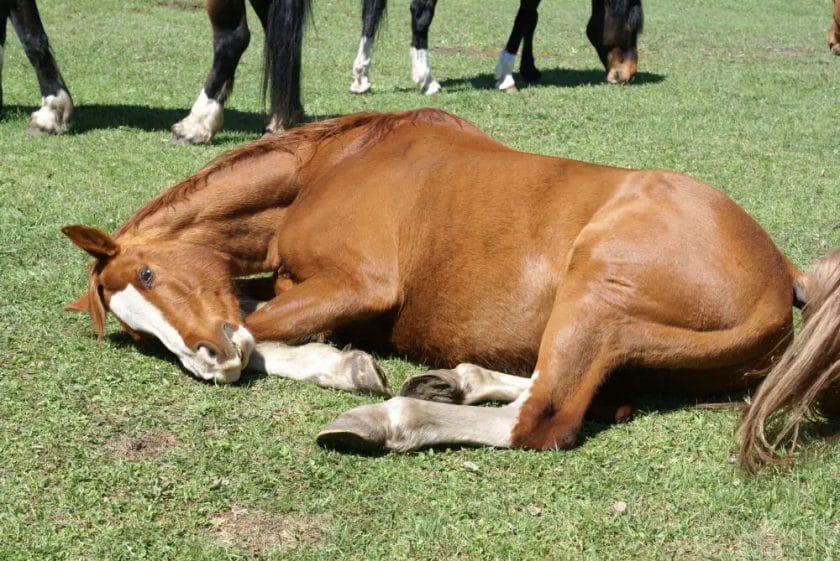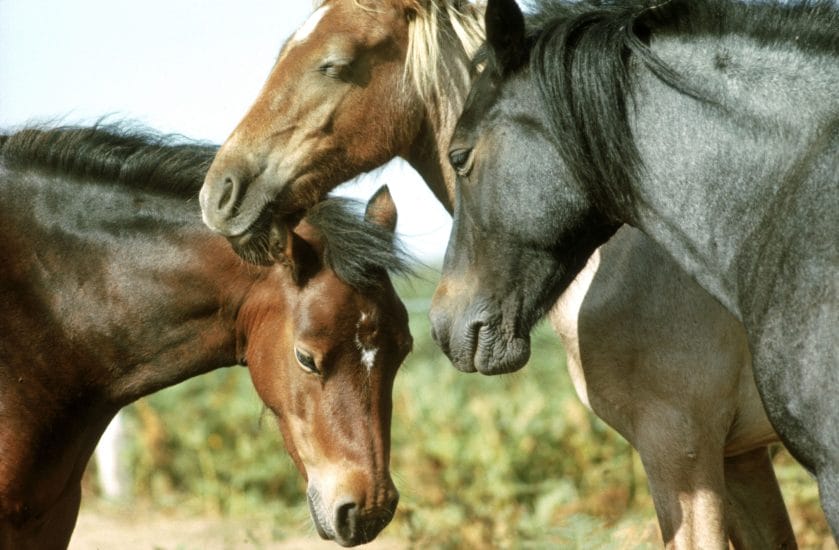Have you ever wondered how horses can sleep standing up? It’s a fascinating adaptation that enables them to rest while remaining alert to potential predators. Horses have a specialized locking mechanism in their legs called the stay apparatus, which allows them to relax their muscles and doze off without the risk of falling over.
This unique ability also allows horses to quickly wake up and take flight if they sense danger. While they do lie down to achieve deep REM sleep, the ability to sleep standing up is an essential survival skill for horses in the wild.

Understanding the Anatomy and Physiology Behind Horses’ Ability to Sleep Standing Up
Horses are fascinating creatures with remarkable abilities, one of which is their ability to sleep while standing up. It is a unique adaptation that sets them apart from many other animals. In this section, we will explore the anatomy and physiology behind this extraordinary feat.
Skeletal System:
Horses have a complex skeletal system that plays a crucial role in their ability to sleep standing up. Their legs are specifically designed to support their weight while they rest. The equine skeleton is made up of long, strong bones that provide stability and support. The arrangement of the bones in the legs helps the horse maintain balance and prevent falling during sleep.
Muscular System:
The muscular system of a horse works in tandem with its skeletal system to enable it to sleep standing up. The muscles in the legs, known as the stay apparatus, are responsible for keeping the horse in an upright position. These muscles lock the joints in the legs, allowing the horse to relax and doze off without collapsing.
Nervous System:
The nervous system of horses plays a vital role in their ability to sleep standing up. Horses have a unique sleep pattern called “polyphasic sleep,” which means they have multiple short periods of sleep throughout the day. During these short naps, horses enter a light sleep state known as “slow-wave sleep.” This state allows them to rest and rejuvenate without fully lying down.
Sense of Balance:
Horses have a highly developed sense of balance, which is essential for their ability to sleep standing up. Their inner ear plays a crucial role in maintaining balance and spatial orientation. By relying on their sense of balance, horses can adjust their posture and make small adjustments to prevent falling while they sleep.
Flight Instinct:
Horses are prey animals with a natural instinct to flee from potential danger. Sleeping standing up allows them to react quickly if a predator or threat approaches. By remaining on their feet, horses can quickly assess their surroundings and make a swift escape if necessary.
The Role of Rest:
While horses can sleep standing up, it is important to note that they still require restorative sleep lying down. Horses need deep REM (Rapid Eye Movement) sleep to allow for complete rest and muscle recovery. In order to achieve this, horses will lie down for short periods of time during the day or night, usually in a safe and comfortable environment.
In summary, the ability of horses to sleep standing up is a remarkable adaptation that is supported by their unique anatomy and physiology. Their skeletal and muscular systems, along with their nervous system and sense of balance, all contribute to their ability to doze off while remaining on their feet. However, it is crucial to provide horses with the opportunity to lie down for deep, restorative sleep to ensure their overall well-being.

Factors that Influence a Horse’s Decision to Sleep Standing or Lying Down
One fascinating aspect of a horse’s behavior is its ability to sleep both standing up and lying down. Unlike humans who require a horizontal position to sleep, horses have the ability to enter a state of sleep while on their feet. However, they also have the option to lie down for a more restful sleep. The decision of whether to sleep standing or lying down is influenced by various factors, including:
1. Safety and Security
Horses are prey animals and have evolved in an environment where they need to be constantly alert to potential threats. When horses sleep standing up, they are able to quickly react to any danger that may approach. They can easily flee or defend themselves from predators or other potential threats. Sleeping standing up allows them to maintain a level of vigilance and be ready to respond to any sudden movements or sounds.
On the other hand, lying down to sleep exposes horses to greater vulnerability. When horses are lying flat on the ground, they are less able to respond quickly to danger. It takes more time for them to get up and escape, putting them at a disadvantage if a predator or threat were to approach.
2. Relaxation and Restfulness
Despite the advantages of sleeping standing up for safety, horses still require periods of deep and restful sleep to maintain their overall well-being. Lying down allows horses to enter a deeper stage of sleep where they can fully relax. When horses lie down, their muscles can rest and their bodies can fully unwind, resulting in a more rejuvenating sleep.
Sleeping standing up only allows horses to enter a light stage of sleep, known as a dozing state. While this state provides some rest, it is not as restorative as the deep sleep experienced while lying down. Therefore, horses need to balance their need for safety with their need for quality sleep.
3. Comfort and Physical Well-being
The decision to sleep standing or lying down can also be influenced by the horse’s physical well-being. Horses with certain health conditions or discomfort may find it more difficult to lie down and get up. Arthritic horses or those with joint issues may experience pain or stiffness when trying to lie down or get back up again. In such cases, horses may prefer to sleep standing up, as it requires less physical effort and discomfort.
Additionally, the surface on which the horse rests can impact its decision. Horses may choose to lie down if they have access to a soft and comfortable bedding material, such as straw or shavings. The soft bedding provides additional support and cushioning for the horse’s body, promoting a more comfortable sleep. Conversely, if the ground is hard or uneven, horses may be more inclined to sleep standing up to avoid discomfort.
4. Social Dynamics
Horses are social animals and their decision to sleep standing or lying down can also be influenced by their herd dynamics. In a herd setting, horses rely on each other to watch for potential threats while others sleep. They take turns standing guard while the rest of the herd sleeps. This rotation of sentinels allows horses to alternate between sleeping standing up and lying down, ensuring that the herd is protected at all times.
If a horse is in a herd where there is a strong bond or hierarchy, it may feel more secure to lie down knowing that another trusted herd member is keeping watch. Conversely, if a horse is in a less stable or unfamiliar social group, it may be more inclined to sleep standing up to maintain its own security.
Summary
The decision of whether a horse sleeps standing or lying down is influenced by a combination of factors including safety, relaxation, comfort, physical well-being, and social dynamics. Horses have evolved to be able to sleep standing up to ensure their safety and vigilance against potential threats. However, they also have the need for deep and restful sleep, which is best achieved by lying down. The choice ultimately depends on the individual horse’s assessment of its environment and its own physical and social circumstances.

Tips for ensuring horses get quality sleep while standing
Just like humans, horses need quality sleep to stay healthy and function properly. While most people are familiar with horses sleeping lying down, they can also sleep while standing up. In fact, horses have a unique ability to doze off while standing, allowing them to rest and be ready to react quickly if necessary. However, ensuring that horses get quality sleep while standing requires some attention and proper management. Here are some tips to help horses get the sleep they need:
1. Provide a comfortable environment
Horses need a safe and comfortable environment to feel secure and relaxed enough to sleep. Make sure their living space is free from hazards, such as sharp objects or uneven terrain, that may cause discomfort or injury. Provide soft bedding in their stalls to cushion their hooves and joints, and ensure that the area is well-ventilated to promote good air circulation.
2. Establish a consistent routine
Horses are creatures of habit, and establishing a regular routine can help them feel more at ease and encourage better sleep patterns. Stick to a consistent feeding and turnout schedule, as well as regular exercise and grooming routines. Consistency in their daily routine can promote relaxation and make it easier for them to fall asleep and stay asleep.
3. Maintain a calm and quiet atmosphere
Horses are sensitive animals and can be easily disturbed by loud noises, sudden movements, or bright lights. Create a calm and quiet environment for your horse to encourage relaxation and uninterrupted sleep. Avoid placing their stalls near high-traffic areas or sources of excessive noise. Use soft lighting during nighttime hours to mimic natural light levels and help promote sleep.
4. Provide companionship
Horses are social animals and prefer the company of other horses. Having equine companions can help reduce stress and anxiety, allowing them to feel more secure and offering a sense of safety while they sleep. If possible, keep horses in pairs or small groups to provide companionship and promote a more natural sleep environment.
5. Regular exercise
Regular exercise is not only essential for a horse’s physical health but also for their mental well-being and sleep quality. Engage your horse in regular exercise and turnout to expend energy and promote relaxation. A tired horse is more likely to sleep deeply and restfully.
6. Monitor for signs of sleep deprivation
It’s important to monitor your horse for any signs of sleep deprivation, as prolonged lack of quality sleep can have adverse effects on their overall health and well-being. Look out for signs such as excessive yawning, droopy eyelids, irritability, weight loss, or changes in behavior. If you notice any of these signs, consult with a veterinarian to address any underlying issues and ensure your horse gets the sleep they need.
7. Consider specialized bedding
Some horses may benefit from specialized bedding options to enhance their comfort and sleep quality while standing. Options such as thick rubber mats or soft, supportive surfaces can provide additional cushioning and reduce the strain on their hooves and joints. Speak with a veterinarian or equine specialist to determine the best bedding option for your horse’s individual needs.
In summary, horses can sleep while standing, but it’s important to provide them with a comfortable and secure environment to promote quality sleep. By following these tips, you can help ensure that your horse gets the sleep they need to stay healthy and happy.
Common misconceptions about horses’ sleep patterns and behaviors
Horses are fascinating animals that have captured our imagination for centuries. With their graceful movements and majestic appearance, it’s no wonder they have become symbols of strength and beauty. However, there are many misconceptions about horses, including their sleep patterns and behaviors. In this section, we will explore some common misconceptions and shed light on the truth behind them.
1. Horses sleep standing up:
One of the most prevalent misconceptions about horses is that they sleep standing up. While it is true that horses are capable of dozing off while standing, they do actually lie down to get proper sleep. Horses have a unique ability to lock their knees, allowing them to rest while standing up. However, they need to lie down for deep sleep. During deep slumber, they may roll onto their side or even their back.
2. Horses don’t dream:
Contrary to popular belief, horses do dream. Just like humans and many other animals, horses go through different stages of sleep, including Rapid Eye Movement (REM) sleep. During REM sleep, horses may exhibit various behaviors such as muscle twitching, eye movement, and even vocalization. It is believed that horses dream about things they experience in their daily lives, such as grazing in a lush pasture or running freely in a field.
3. Horses require little sleep:
Another misconception is that horses require very little sleep. In reality, horses need around 2-3 hours of sleep each day. However, unlike humans who have consolidated sleep patterns, horses have a polyphasic sleep pattern, meaning they sleep in shorter periods throughout the day and night. This allows them to rest and rejuvenate, even while standing up or grazing.
4. Horses can sleep while traveling:
Some people believe that horses can sleep while traveling, such as when being transported in a trailer or during long rides. While horses can doze off to some extent while in motion, they still need proper sleep. It is essential for horses to have regular rest periods to prevent fatigue and maintain their overall well-being. Transporting horses should include scheduled breaks to allow them to lie down and sleep.
5. Horses don’t sleep deeply:
Many people think that horses never enter deep sleep due to their flight response and constant need to be alert for potential threats. While it is true that horses are more vigilant than some other animals, they do experience deep sleep. Horses have evolved to sleep in short bouts of deep sleep, allowing them to rest and be aware of their surroundings. They have developed the ability to quickly wake up and respond to any potential danger.
Summary:
Horses’ sleep patterns and behaviors are often misunderstood. Contrary to popular belief, horses do lie down for deep sleep and have the ability to dream. They require around 2-3 hours of sleep each day and have a polyphasic sleep pattern. While they can doze off while standing or traveling, horses still need proper rest to maintain their well-being. It’s important to debunk these common misconceptions to better understand and care for these magnificent creatures.
FAQs
1. How can horses sleep standing up?
Horses have a unique ability to lock their leg joints, allowing them to doze off while standing. This helps them stay upright and ready to flee from predators quickly if needed. They also experience a type of sleep called “unihemispheric slow-wave sleep,” where one hemisphere of their brain sleeps while the other remains alert.
2. How much do horses eat each day?
On average, horses consume about 2-2.5% of their body weight in forage, such as hay or grass, each day. This means that a 1,000-pound horse would eat around 20-25 pounds of forage daily. However, individual needs may vary depending on the horse’s age, activity level, and overall health.
3. How long do horses live?
The lifespan of a horse can vary depending on various factors, including breed, care, and genetics. On average, horses live to be around 25 to 30 years old. However, with proper care, some horses can live well into their 30s or even 40s.
Conclusion:
In conclusion, the ability of horses to sleep standing up is a fascinating adaptation that enables them to rest and remain alert simultaneously. This unique behavior is primarily due to their specialized anatomical features and ability to lock their joints. By standing, horses can quickly respond to potential dangers in their surroundings, ensuring their survival in the wild. Additionally, sleeping while standing reduces the risk of muscle fatigue and allows horses to conserve energy. While they do lie down to achieve deep sleep, the ability to sleep standing up is a remarkable aspect of their biology and contributes to their incredible resilience as majestic and adaptable creatures.
